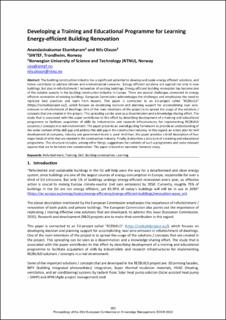| dc.contributor.author | Ekambaram, Anandasivakumar | |
| dc.contributor.author | Olsson, Nils | |
| dc.date.accessioned | 2022-12-16T08:04:13Z | |
| dc.date.available | 2022-12-16T08:04:13Z | |
| dc.date.created | 2022-12-06T14:09:54Z | |
| dc.date.issued | 2022 | |
| dc.identifier.isbn | 978-1-914587-45-0 | |
| dc.identifier.uri | https://hdl.handle.net/11250/3038143 | |
| dc.description.abstract | The building construction industry has a significant potential to develop and apply energy efficient solutions, and hence contribute to address climate and environmental concerns. Energy efficient solutions are applied not only in new buildings, but also in refurbishment / renovation of existing buildings. Energy efficient building renovation has become one of the notable aspects in the building construction industry in Europe. There are several challenges connected to energy efficient renovation of existing buildings. European Commission acknowledges the challenges and emphasizes the need to replicate best practices and learn from lessons. This paper is connected to an EU-project called "REZBUILD" (https://rezbuildproject.eu/), which focuses on developing decision and planning support for accomplishing near zero-emission in refurbishment of dwellings. One of the main intentions of the project is to spread the usage of the solutions / concepts that are created in the project. This spreading can be seen as a dissemination and a knowledge sharing effort. The study that is associated with this paper contributes to this effort by describing development of a training and educational programme to facilitate acquisition of skills by industrialists and research infrastructures for implementing REZBUILD solutions / concepts in a real environment. The paper presents an overall guiding framework to provide an understanding of the wider context of the skill-gap and address the skill-gap in the construction industry. In this regard, an action plan for skill development at company, industry and government levels is used. And then, the paper provides a brief description of four major kinds of skills that are needed in the construction industry. Finally, it describes a structure of a training and educational programme. This structure includes, among other things, suggestions for contents of such a programme and some relevant aspects that are to be taken into consideration. The paper is based on narrative literature study. | en_US |
| dc.language.iso | eng | en_US |
| dc.publisher | ECKM | en_US |
| dc.relation.ispartof | Proceedings of the 23rd European Conference on Knowledge Management, Vol. 23 No. 1 (2022) | |
| dc.relation.ispartof | Proceedings of the 23rd European Conference on Knowledge Management | |
| dc.rights | CC BY NC ND 4.0 | * |
| dc.rights.uri | http://creativecommons.org/licenses/by-nc-nd/4.0/ | * |
| dc.subject | Refurbishment | en_US |
| dc.subject | Training | en_US |
| dc.subject | Skill | en_US |
| dc.subject | Building construction | en_US |
| dc.subject | Learning | en_US |
| dc.title | Developing a training and educational programme for learning energy-efficient building renovation | en_US |
| dc.type | Chapter | en_US |
| dc.type | Peer reviewed | en_US |
| dc.type | Conference object | en_US |
| dc.description.version | publishedVersion | en_US |
| dc.rights.holder | © 2022 Copyright European Conference on Knowledge Management | en_US |
| dc.subject.nsi | VDP::Samfunnsvitenskap: 200 | en_US |
| dc.source.pagenumber | 353-361 | en_US |
| dc.identifier.cristin | 2089474 | |
| dc.relation.project | EC/H2020/768623 | en_US |
| cristin.ispublished | true | |
| cristin.fulltext | original | |
| cristin.qualitycode | 1 | |

